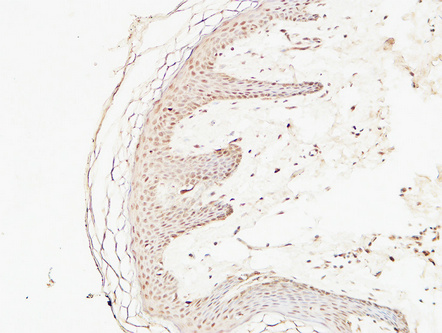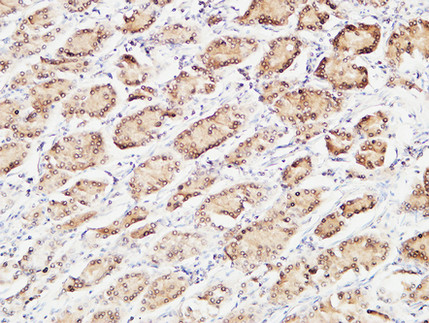EGF Polyclonal Antibody
- Catalog No.:YT5880
- Applications:WB;IHC;IF;ELISA
- Reactivity:Human;Mouse;
- Target:
- EGF
- Fields:
- >>EGFR tyrosine kinase inhibitor resistance;>>MAPK signaling pathway;>>ErbB signaling pathway;>>Ras signaling pathway;>>Rap1 signaling pathway;>>Calcium signaling pathway;>>HIF-1 signaling pathway;>>FoxO signaling pathway;>>Phospholipase D signaling pathway;>>PI3K-Akt signaling pathway;>>Focal adhesion;>>Gap junction;>>JAK-STAT signaling pathway;>>Regulation of actin cytoskeleton;>>Hepatitis C;>>Human papillomavirus infection;>>Pathways in cancer;>>Chemical carcinogenesis - receptor activation;>>Chemical carcinogenesis - reactive oxygen species;>>Colorectal cancer;>>Pancreatic cancer;>>Endometrial cancer;>>Glioma;>>Prostate cancer;>>Melanoma;>>Bladder cancer;>>Non-small cell lung cancer;>>Breast cancer;>>Gastric cancer;>>Choline metabolism in cancer;>>PD-L1 expression and PD-1 checkpoint pathway in cancer
- Gene Name:
- EGF
- Protein Name:
- Pro-epidermal growth factor (EGF) [Cleaved into: Epidermal growth factor (Urogastrone)]
- Human Gene Id:
- 1950
- Human Swiss Prot No:
- P01133
- Mouse Gene Id:
- 13645
- Mouse Swiss Prot No:
- P01132
- Immunogen:
- Synthetic peptide from human protein at AA range: 1000-1060
- Specificity:
- The antibody detects endogenous EGF
- Formulation:
- Liquid in PBS containing 50% glycerol, 0.5% BSA and 0.02% sodium azide.
- Source:
- Polyclonal, Rabbit,IgG
- Dilution:
- WB 1:500-2000,IHC 1:500-200, ELISA 1:10000-20000. IF 1:50-200
- Purification:
- The antibody was affinity-purified from rabbit antiserum by affinity-chromatography using epitope-specific immunogen.
- Concentration:
- 1 mg/ml
- Storage Stability:
- -15°C to -25°C/1 year(Do not lower than -25°C)
- Other Name:
- Pro-epidermal growth factor (EGF) [Cleaved into: Epidermal growth factor (Urogastrone)]
- Observed Band(KD):
- 130kD
- Background:
- This gene encodes a member of the epidermal growth factor superfamily. The encoded preproprotein is proteolytically processed to generate the 53-amino acid epidermal growth factor peptide. This protein acts a potent mitogenic factor that plays an important role in the growth, proliferation and differentiation of numerous cell types. This protein acts by binding with high affinity to the cell surface receptor, epidermal growth factor receptor. Defects in this gene are the cause of hypomagnesemia type 4. Dysregulation of this gene has been associated with the growth and progression of certain cancers. Alternative splicing results in multiple transcript variants, at least one of which encodes a preproprotein that is proteolytically processed. [provided by RefSeq, Jan 2016],
- Function:
- disease:Defects in EGF are the cause of hypomagnesemia type 4 (HOMG4) [MIM:611718]; also known as renal hypomagnesemia normocalciuric. HOMG4 is a disorder characterized by massive renal hypomagnesemia and normal levels of serum calcium and calcium excretion. Clinical features include seizures, mild-to mederate psychomotor retardation, and brisk tendon reflexes.,function:EGF stimulates the growth of various epidermal and epithelial tissues in vivo and in vitro and of some fibroblasts in cell culture. Magnesiotropic hormone that stimulates magnesium reabsorption in the renal distal convoluted tubule via engagement of EGFR and activation of the magnesium channel TRPM6.,online information:Epidermal growth factor entry,similarity:Contains 9 EGF-like domains.,similarity:Contains 9 LDL-receptor class B repeats.,tissue specificity:Expressed in kidney, salivary gland, cerebrum and prostate.,
- Subcellular Location:
- Membrane; Single-pass type I membrane protein.
- Expression:
- Expressed in kidney, salivary gland, cerebrum and prostate.
- June 19-2018
- WESTERN IMMUNOBLOTTING PROTOCOL
- June 19-2018
- IMMUNOHISTOCHEMISTRY-PARAFFIN PROTOCOL
- June 19-2018
- IMMUNOFLUORESCENCE PROTOCOL
- September 08-2020
- FLOW-CYTOMEYRT-PROTOCOL
- May 20-2022
- Cell-Based ELISA│解您多样本WB检测之困扰
- July 13-2018
- CELL-BASED-ELISA-PROTOCOL-FOR-ACETYL-PROTEIN
- July 13-2018
- CELL-BASED-ELISA-PROTOCOL-FOR-PHOSPHO-PROTEIN
- July 13-2018
- Antibody-FAQs
- Products Images

- Western blot analysis of 293T mouse-kidney lysate, antibody was diluted at 2000. Secondary antibody(catalog#:RS0002) was diluted at 1:20000

- Immunohistochemical analysis of paraffin-embedded Human skin. 1, Antibody was diluted at 1:200(4° overnight). 2, High-pressure and temperature EDTA, pH8.0 was used for antigen retrieval. 3,Secondary antibody was diluted at 1:200(room temperature, 30min).

- Immunohistochemical analysis of paraffin-embedded Human gastric cancer. 1, Antibody was diluted at 1:100(4° overnight). 2, High-pressure and temperature EDTA, pH8.0 was used for antigen retrieval. 3,Secondary antibody was diluted at 1:200(room temperature, 30min).



